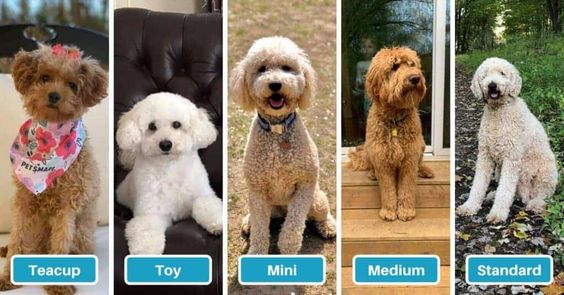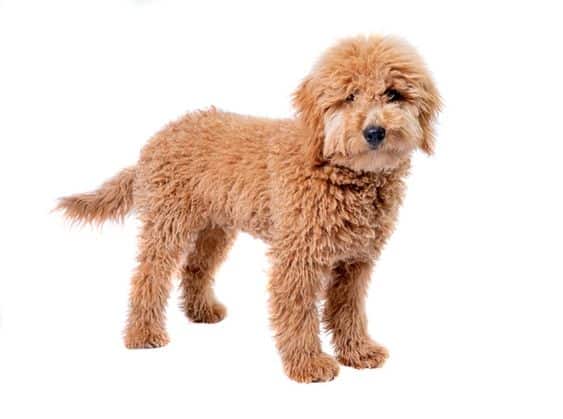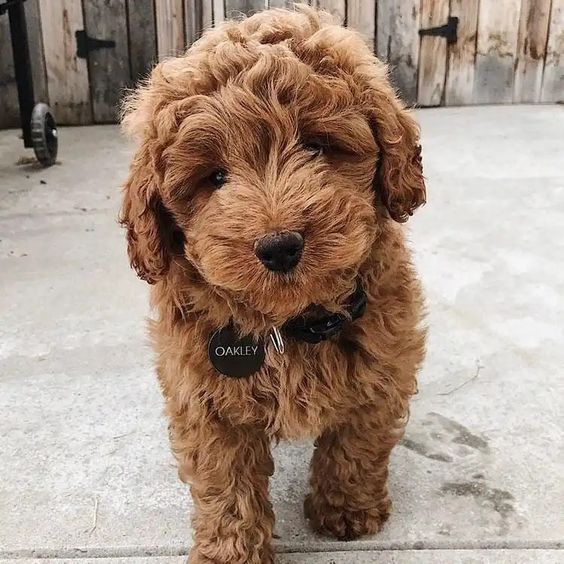Mini Goldendoodle: Size, Health, Personality, Facts
If you want a dog friend that isn’t too big but still has a lot of personality, the Mini Goldendoodle might be the best choice. These cute dogs have become famous because they are small, friendly, and have beautiful coats.
We’ll talk about everything you need to know about Mini Goldendoodles in this guide, from their health and pros and cons to their size and unique traits.
This guide will help you learn more about the appealing Mini Goldendoodle breed, whether you’re considering getting one of these cute dogs or already have one and love it.
An Overview of Mini Goldendoodle & Its Weight

A Mini Goldendoodle is a breed that comes from the fact that they are a cross between a Golden Retriever and a Miniature Poodle. People love them as pets and friends because they are known for being friendly and loving. The Mini Goldendoodle puppies have soft, wavy coats that can be any color from cream and gold to peach and red. They are intelligent, easy to train, and friendly dogs that get along well with people, kids, and other pets.
A mini Goldendoodle usually weighs between 15 to 35 pounds and stands 14 to 20 inches tall at the shoulder, making them suitable for apartment life and smaller homes. It is common for these dogs to live between 10 and 15 years and are known for being very loyal and devoted to their owners.
Mini Goldendoodle Size: From Size Small to Full-Grown
One great thing about Mini Goldendoodles is that they are small enough to handle. These puppies are cute when they are small and fluffy and grow to be small and friendly.
Here is a picture of their height and weight to help you see how their sizes change from puppy stage to full-grown.

1. Mini Goldendoodle Puppies
As a rule, these little fur balls are between 5 and 10 pounds and 12 to 17 inches tall at the shoulder. Because they are so small, they are very cute and great for people who want a small but playful pet.
2. Mini Goldendoodle Full-Grown
Most Mini Goldendoodles are between 15 to 35 pounds and 14 to 20 inches tall at the shoulder when fully grown. These fully grown Mini Goldendoodles are still small but full of energy and love, making them great family pets.
Mini Goldendoodle Lifespan: Years of Joy and Companionship

Mini Goldendoodles are known to live pretty long, so you’ll love having them in your homes for years to come. These puppies usually live between 10 and 15 years if they are well cared for. Because they live together, your Mini Goldendoodle will be a loyal and loving friend for a big part of your life, giving you joy and company for many years.
Their constant presence and loving nature make ties that last a lifetime and make them an important part of the family. From playing together to being there for you when things get tough, your Mini Goldendoodle will bring you joy and company, making everyday moments extraordinary.
Mini Goldendoodles: Health Guide and Characteristics
The Mini Goldendoodle breed is interesting because it has a unique mix of traits and health issues. This section discusses these cute dogs’ personalities, giving you a full picture of what makes them special.

1. Mini Goldendoodle Characteristics
Hair
The Mini Goldendoodle’s hair is what makes it unique. It is soft, wavy, and luxurious. Their hair can be any color, from cream and hold to apricot and red, and their looks can be different. This pretty coat makes them look like real teddy bears and even cuter. In addition to looking good, their hair needs to be brushed regularly to keep it looking great and stop it from matting.
Size
Mini Goldendoodles are, as their name suggests, small dogs that are great for people who live in flats or small homes. Even though they are small, they are still fun to play with, and for how fragile they are, they can be surprisingly strong. Because they are small, they are easy to handle and make a great choice for families who want a smaller breed with a big heart.
Temperament
Mini Goldendoodles are known for being smart, friendly, and loving. As golden retrievers and miniature poodles, they get the best traits from each other. Their behavior shows their smartness, making them very easy to train. These dogs love spending time with their owners, and because they are friendly, they get along well with kids and other pets. Whether you want to play or fetch in the yard or relax on the couch, Mini Goldendoodles are great pets that can handle all kinds of situations.
2. Quick Health Guide for Goldendoodles: Taking Care of Health
Ear Infections
Mini Goldendoodles can get ear infections because their ears lie down a lot. Their ear tubes can get clogged with dirt and moisture, which makes it easy for conditions to grow. To avoid these problems, cleaning and checking their ears is important. Talk to your vet about how to clean your pet’s ears safely and effectively.
Hip Dysplasia
Hip dysplasia is a genetic disease that affects the hip joint that can happen to Mini Goldendoodles and many other breeds. This problem can make you feel bad and make it hard to move around. You must keep a healthy weight and move regularly to lower the risk. Talking to a vet can give you more information on how to treat hip dysplasia in your Mini Goldendoodle.
Allergies
Some Mini Goldendoodles can get allergies, usually because of their fur. Skin irritations or stomach problems are all signs of allergies. Regular cleaning, like bathing and brushing, can help with allergies caused by their hair. Giving them good and balanced food can also help their health and maybe even lower the number of allergic reactions they have.
Kneecap Dislocation
Mini Goldendoodles can get this condition in which the kneecap comes out of place. Though it does happen sometimes, it can be controlled by exercising and watching your weight. Keeping your Mini Goldendoodle at a healthy weight lowers the chance of getting patellar luxation or other joint problems.
Prevention care, regular visits to the vet, and a healthy diet are all important parts of ensuring your Mini Goldendoodle stays healthy and happy in the long run. With these health issues, you can give your beloved pet the best care possible.
Mini Goldendoodle Pros and Cons: What to Consider Before Adopting
Before getting a Mini Goldendoodle, you should carefully consider how to care for it, how it will behave, and how it will fit into your life.
Let’s look at some Pros and cons of a Mini Goldendoodle.

Pros
1. Size
One of the best things about having a Mini Goldendoodle is how small they are. Because they are small, they are great for living in apartments and other small houses. Sometimes, a Mini Goldendoodle is the best dog for people with less space.
2. Friendly at Heart
Mini Goldendoodles are known for being friendly and outgoing. Of course, they love people and are generally great with kids and other pets. Because they are nice, they will quickly become a beloved part of your family.
3. Intelligence
These dogs are very smart and easy to train. Their poodle genes make them smart, which helps them learn quickly. Because they are smart, they are easier to train, whether you are giving them basic commands or more complicated tricks.
4. Ability to Change
Mini Goldendoodles can change. They can do well there, whether you live in a busy city apartment or a quiet suburban house. Because they are calm and easygoing, they can easily adapt to new habits and ways of life.
Cons
1. Hair
Their hair is beautiful, but it needs to be brushed regularly to keep it healthy and avoid matting. Their wavy fur can get tangled, so you’ll need to touch them and maybe even get a professional groomer to keep them looking their best.
2. Needs Daily Exercise
Mini Goldendoodles are busy dogs that need daily exercise to stay healthy and happy. This breed might not be the best fit for you if you are always on the go or don’t like being active. Their health depends on walking, playing, and keeping their mind busy.
3. Allergies
People who might be allergic may need to make changes to their food. Sometimes, Mini Goldendoodles may be allergic to something about their hair. A healthy diet can help with these allergies, but you should be ready for possible dietary limits and extra care.
4. Training Commitments
Their knowledge can be a good thing, but it can also be bad if it’s not used correctly. Mini Goldendoodles need regular training and mental activity to keep them from getting bored and acting up. Be ready to put time into helping them learn.
What Does the Mini Goldendoodle Personality Look Like?
Before bringing a Mini Goldendoodle into your home, you should learn about its nature. Many wonderful things about these cute dogs make them truly unique.

1. Playful and Full of Energy
One thing that makes them unique is how fun they are. These dogs have what seems like an endless amount of energy and love to play and do other things. Their favorite things are fetching, running in the park, and playing with other dogs. Their excitement can spread to any home and make everyone happy.
2. Affectionate
Mini Goldendoodles are very affectionate and don’t mind showing it. They enjoy being close to their human family members and will often go for hugs and kisses. The Mini Goldendoodle is the ideal choice for those seeking a dog that will love and be with them no matter what.
3. Social Butterflies
As the name suggests, Mini Goldendoodles are very friendly dogs. They like being around both people and other animals. They get along well with kids, other pets, and even strangers because they are warm. They are the life of the party at social events and can help people get to know each other by being friendly and open.
4. Adaptable
A mini Goldendoodle can adjust to your way of life, whether you live in the city or the country. They are very adaptable dogs that do well in various living situations and habits. Because they are flexible, they can be used by both people and families, whether in a small apartment or a large house.
5. Loyal Companions
Mini Goldendoodles are naturally loyal to the people in their families. They make strong bonds and are known for being devoted to each other no matter what. Because they care about you, they’ll be there for you through the good and bad times of life, giving you comfort and support when needed.
Most Common Mini Goldendoodle Health Issues
Even though Mini Goldendoodles are usually healthy, it’s important to know about the health problems that can happen to them. You can ensure your pet friend lives a long and healthy life by learning about these common health problems.

1. Allergies
Some Mini Godlendoodles can have skin and food allergies. Skin irritations, itching, or stomach problems are all signs of allergies. Even though changes to your dog’s food and proper grooming can help with allergies, it’s important to talk to your vet to determine which allergens are bothering your dog and develop a good treatment plan.
2. Heart Disease
Some Mini Goldendoodles may be more likely to get heart problems, but it’s uncommon. If you take your pet to the vet regularly, feed them balanced food, and live a healthy life, heart problems are less likely.
3. Eye Problems
Some Mini Goldendoodles may be more likely to get eye problems like glaucoma and cataracts. A veterinary ophthalmologist can help find and treat these problems by checking your pet’s eyes regularly. Getting help for your dog’s vision and general eye health as soon as possible is very important.
4. Ear Infections
Mini Goldendoodles can get ear infections because their ears lie down a lot. They can accumulate moisture and debris stuck in their ear tubes, which makes it easy for conditions to grow. To avoid these problems, cleaning and checking your pet’s ears is important. Your vet can advise you on properly caring for your pet’s ears.
5. Hypoplasia
Hypoplasia of the hip joint is caused by genes and is known as dysplasia. It can make you feel bad and make it hard to move around. It’s very important to keep your mini goldendoodle at a healthy weight and give it regular exercise to lower the chance. Sometimes surgery is needed to fix the problem, so finding and fixing it is very important.
Conclusion
Mini Goldendoodles are the cutest, smartest, and most charming dogs ever. Their manageable size, friendly personality, and long life span make them great pets for people and families. Whether you like them, these dogs can make your home happier because they are friendly, playful, or smart.
All of these dogs can make your home happier, whether you like them because they are friendly, playful, or smart. It’s important to know what they need regarding care, exercise, and possible health problems. Always give them love, exercise, and care; they’ll be your loyal friends for years.
If you’re considering getting a Mini Goldendoodle, you’re in for a treat! You can be sure these wonderful dogs will make your home happy.
Frequently Asked Questions
How Big of a Range Does a Mini Goldendoodle Fall?
Most mini goldendoodles are between 15 and 35 pounds and stand 14 to 20 inches tall at the shoulder when they are fully grown. Remember, though, there may be some differences within this range due to genetics and how fast a person grows.
Can Mini Goldendoodles Handle Allergies?
Because they are related to poodles, Mini Goldendoodles are often thought to be hypoallergenic. However, it’s important to remember that no dog breed is completely hypoallergenic. Some people allergic to dogs may still be affected by Mini Goldendoodles. Regular cleaning and keeping their living space clean can help them be less exposed to allergens.
How Often Should a Mini Goldendoodle Run?
To stay healthy and happy, mini Goldendoodles need to go for walks every day. They must go for walks daily, play, and have mental activity to get the exercise they need. Behavior problems can happen if you don’t give your dog enough exercise.
Do Mini Goldendoodles Shed?
Mini Goldendoodles don’t shed much because they are related to poodles. But different dogs may shed in different ways. Regular grooming and brushing can help keep their hair in good shape and reduce shedding.
How Long Does a Mini Goldendoodle Usually Live?
When they are well taken care of, Mini Goldendoodles live for about 10 to 15 years, which is pretty long. Getting your pet healthy food, taking them to the vet regularly, and giving them a loving home can help them live longer and happier lives.

